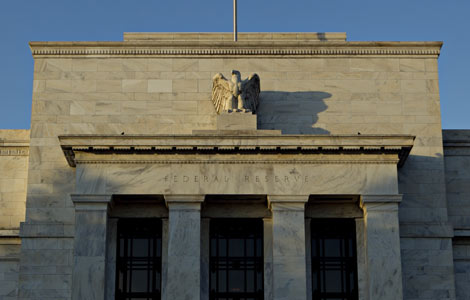US economy 'expanding moderately': Fed
Updated: 2011-12-15 07:55
(China Daily)
|
|||||||||
|
 The US Federal Reserve building in Washington DC. Although the Fed refrained from adopting additional stimulus measures, unemployment at 8.6 percent and risks to global growth from the European debt crisis may prompt more easing in coming months. [Andrew Harrer / Bloomberg] |
Bernanke to keep interest rates low, policy unchanged amid uncertainty
WASHINGTON - US Federal Reserve policymakers said the US economy is maintaining its expansion even as the global economy slows, while refraining from taking new actions to lower borrowing costs.
"The economy has been expanding moderately, notwithstanding some apparent slowing in global growth," the Federal Open Market Committee said in a statement at the conclusion of its meeting on Tuesday in Washington. "While indicators point to some improvement in overall labor market conditions, the unemployment rate remains elevated."
Signs of an improving US economy are giving policymakers led by Chairman Ben S. Bernanke leeway to keep policy unchanged as they discuss ways to improve how they communicate the likely future path of interest rates to the public. At the same time, unemployment at 8.6 percent and risks to global growth from the European debt crisis may prompt more easing in coming months.
"Any additional stimulus is greatly going to depend on what happens in Europe or any changes in the US outlook," said John Silvia, chief economist at Wells Fargo Securities LLC. "They will wait for a longer meeting, maybe in January, to come up with anything regarding communications."
Tuesday's statement reiterated the warning at the Fed's two previous meetings that "strains in global financial markets continue to pose significant downside risks to the economic outlook". Stocks fell after the statement.
Reduced target rate
The Fed left unchanged its statement that economic conditions are likely to warrant "exceptionally low" interest rates "at least through mid-2013".
The central bank lowered its target overnight interest rate to a range of zero to 0.25 percent in December 2008.
The central bank said it would continue its exchange of $400 billion of short-term debt with long-term securities to lengthen the average maturity of its holdings, a move dubbed Operation Twist.
The Fed also did not alter its policy of reinvesting its portfolio of maturing housing debt into agency mortgage-backed securities.
Expectations 'stable'
"Inflation has moderated since earlier in the year, and longer-term inflation expectations have remained stable," the Fed said on Tuesday. By one measure, inflation has decelerated, based on the personal consumption expenditures price index excluding food and energy, the principal indicator the Fed tracks. That gauge rose 0.07 percent in October from September, the second-slowest gain in 2011.
Chicago Fed President Charles Evans dissented for the second meeting in a row, supporting "additional policy accommodation", according to the statement. "There is simply too much at stake for us to be excessively complacent while the economy is in such dire shape," Evans said in a speech last week.
However, improvement in some US statistics signals growth may be picking up. The index of leading economic indicators rose 0.9 percent in October, the most since February. A consumer confidence index from the Conference Board rose in November to the highest since July. Manufacturing expanded in November at the fastest pace in five months, according to the Institute for Supply Management's factory index.
Retail sales
A report on retail sales on Tuesday was an exception. Purchases in November rose 0.2 percent, less than forecast by economists and the slowest pace in five months, indicating that faster job growth may be needed to spark the biggest part of the economy.
"There are still significant risks and most of them are political," said Ward McCarthy, chief financial economist at Jefferies & Co. "The European politicians need to get their act together and the same applies to those who live in Washington."
The Fed in recent months has been joined by counterparts around the world in trying to stimulate economies and limit effects of Europe's turmoil. The European Central Bank (ECB) and its counterparts in the United Kingdom and China have all taken steps to ease monetary policy since the Fed began Operation Twist in September.
Last week, European leaders agreed after all-night talks to make loans of as much as 200 billion euros ($264 billion) to the International Monetary Fund to counter the crisis and tightened rules to curb future debts. Whether the euro is saved may hinge on support from investors, central bankers and credit-rating companies.
'Forceful' steps
Fed policymakers have been stepping up their warnings about Europe's debt crisis.
Fed Vice-Chairman Janet Yellen said on Nov 29 that Europe needs to take "forceful" steps to quell fiscal and financial turmoil, and San Francisco Fed President John Williams said the same day that Europe is the biggest risk to the global economy.
The next day, the Fed led six central banks in announcing a half percentage-point cut in the cost of emergency dollar funding for financial companies. The money comes from the Fed's currency-swap lines.
The action triggered a stock and bond rally, and the following week, the ECB's three-month dollar lending through the swap lines surged to $50.7 billion from $400 million.
Bloomberg News











